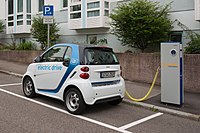As of March 2022, there were about 76,000 fully electric vehicles and 57,000 plug-in hybrid vehicles in Quebec. As of 2021, about 6.8% of new vehicle registrations in Quebec were electric.
Government policy
Quebec began offering rebates of up to $8,000 beginning on January 1, 2012, for the purchase of new plug-in electric vehicles equipped with a minimum of 4 kWh battery, and new hybrid electric vehicles are eligible for a $1,000 rebate. All-electric vehicles with high-capacity battery packs were eligible for the full $8,000 rebate, and incentives were reduced for low-range electric cars and plug-in hybrids. Quebec's government earmarked $50 million for the program, and the maximum rebate amount was set to be slowly reduced every year until a maximum of $3,000 in 2015, but the rebates would continue until the fund runs out. There was also a ceiling for the maximum number of eligible vehicles: 10,000 for all-electric vehicles and plug-in hybrids, and 5,000 for conventional hybrids.
In November 2013, the provincial government announced its decision to earmark in 2014 an additional $65 million to fund a three-year extension to the electric-vehicle rebate program. The maximum rebate was kept at $8,000, but a graded scale was introduced in order to spread the incentive over 10,000 or more vehicles. Quebec's government also set the goal to deploy 12,500 more electric vehicles in the province by 2017, consisting of 10,200 consumer cars, 325 taxis, and 2,000 government-fleet vehicles. Also, incentives were issued for "greening" 525 taxis, aimed to introduce 325 plug-in vehicles (275 plug-in hybrids and 50 all-electrics) and 200 conventional hybrids. The purchase incentives start at $20,000 for battery-electric taxis, $12,000 for plug-in hybrids, and $3,000 for conventional hybrids, with the rebate declining over time. The province planned to also subsidize the deployment of charging stations for taxis.
In October 2016, the National Assembly of Quebec passed a new zero emission vehicle legislation that obliges any carmaker who sells in the Canadian province more than 4,500 new vehicles per year over a three-year average, to offer their customers a minimum number of plug-in hybrid and all-electric models. Under the new law, 3.5% of the total number of autos sold by carmakers in Quebec have to be zero emissions vehicles (ZEV) starting in 2018, rising to 15.5% in 2020. A tradable credit system was created for those carmakers not fulfilling their quotas to avoid financial penalties. The quotas will be determined by Quebec's Ministry of Sustainable Development. Quebec became the first Canadian province to pass such legislation, joining ten U.S. states, including California, that have similar ZEV laws.
As of 1 April 2022, the provincial government offers tax rebates of $7,000 for purchases of electric vehicles, $5,000 for plug-in hybrid vehicles, and $3,500 for used electric vehicles.
As of 2022, the province is legally required to ensure that 17.5% of new vehicles sold in the province by 2025 are electric, 77.5% by 2030, and 100% by 2035.
Charging stations
As of 2022, there were about 3,400 public charging stations in Quebec.
As of December 2020, about 74% of electric vehicle charging in Quebec occurs in private homes.
Manufacturing
Quebec, along with neighboring Ontario, is a major hub for electric vehicle manufacturing in Canada.
References
- Malboeuf, Marie-Claude (May 5, 2022). "Des incendies soudains et tenaces". La Presse (in French). Retrieved May 8, 2022.
- Roy, Lillian (July 29, 2021). "Quebecers account for nearly half the sales of electric vehicles in Canada: why?". CTV News. Retrieved April 21, 2022.
- Eric Loveday (April 11, 2011). "Quebec to offer plug-in vehicle rebates of up to C$8,000". AutoblogGreen. Retrieved June 8, 2011.
- "Running on Green Power! Electric Vehicles: 2011-2020 Québec Action Plan" (PDF). Gouvernement du Québec. 2011. Retrieved June 8, 2011. See Table Box 7 for the rebate details and how it changes by year.
- ^ Klippenstein, Matthew (November 7, 2013). "Will Quebec Join California, Oregon As Electric-Car Pioneers?". Green Car Reports. Retrieved October 28, 2016.
- France Mobilité Électrique - AVERE France (October 28, 2016). "L'Assemblée nationale du Québec adopte la loi véhicules zéro émission" [Quebec's National Assembly enacted a zero emissions vehicle law] (in French). AVERE. Retrieved October 28, 2016.
- Lampert, Allison (October 26, 2016). "Quebec approves new law to boost sales of zero emission vehicles". Reuters. Retrieved October 28, 2016.
- "Quebec budget reduces rebates for electric vehicles". Driving.ca. March 23, 2022. Retrieved April 21, 2022.
- Bellavance, Joël-Denis (April 14, 2022). "Un délai difficile à respecter pour les concessionnaires". La Presse (in French). Archived from the original on April 16, 2022. Retrieved May 8, 2022.
- "Voici comment prévoir des vacances sur la route avec un véhicule électrique". Le Journal de Montréal (in French). May 5, 2022. Retrieved May 8, 2022.
- "Assessing charging infrastructure needs in Québec". International Council on Clean Transportation. February 11, 2022. Retrieved May 8, 2022.
- "Prevost announces a major electrification program with the support of the Government of Quebec". Yahoo! Finance. April 7, 2022. Retrieved April 21, 2022.
- LaReau, Jamie L. (March 7, 2022). "GM's new Canada factory will be key to Michigan electric vehicle production". Detroit Free Press. Retrieved April 21, 2022.
- Friedman, Gabriel (March 11, 2022). "Ontario risks losing its auto crown as cheap, green power gives Quebec the EV edge". Financial Post. Retrieved April 21, 2022.
- Lambert, Fred (November 8, 2021). "Tesla is in talks with Quebec govt amid multi-billion investment into battery production". Electrek. Retrieved April 21, 2022.
- "Québec's Role in the Global EV Revolution". Chicago Council on Global Affairs. March 14, 2022. Retrieved April 21, 2022.
| Electric vehicles | |||||||||||
|---|---|---|---|---|---|---|---|---|---|---|---|
| Vehicle |   | ||||||||||
| Type | |||||||||||
| Charging |
| ||||||||||
| WEVA | |||||||||||